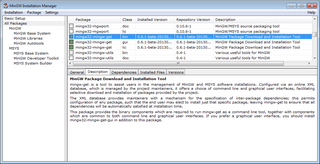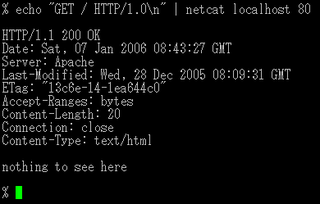
Cygwin is a free and open-source Unix-like environment and command-line interface for Microsoft Windows. The project also provides a software repository containing many open-source packages. Cygwin allows source code for Unix-like operating systems to be compiled and run on Windows. Cygwin provides native integration of Windows-based applications.

GNU is an extensive collection of free software, which can be used as an operating system or can be used in parts with other operating systems. The use of the completed GNU tools led to the family of operating systems popularly known as Linux. Most of GNU is licensed under the GNU Project's own General Public License (GPL).
An integrated development environment (IDE) is a software application that provides comprehensive facilities for software development. An IDE normally consists of at least a source-code editor, build automation tools, and a debugger. Some IDEs, such as IntelliJ IDEA, Eclipse and Lazarus contain the necessary compiler, interpreter or both; others, such as SharpDevelop and NetBeans, do not.

The GNU Autotools, also known as the GNU Build System, is a suite of programming tools designed to assist in making source code packages portable to many Unix-like systems.
System software is software designed to provide a platform for other software. Examples of system software include operating systems (OS).
A cross compiler is a compiler capable of creating executable code for a platform other than the one on which the compiler is running. For example, a compiler that runs on a PC but generates code that runs on Android devices is a cross compiler.

DJ's GNU Programming Platform (DJGPP) is a software development suite for Intel 80386-level and above, IBM PC compatibles which supports DOS operating systems. It is guided by DJ Delorie, who began the project in 1989. It is a port of the GNU Compiler Collection (GCC), and mostly GNU utilities such as Bash, find, tar, ls, GAWK, sed, and ld to DOS Protected Mode Interface (DPMI). Supported languages include C, C++, Objective-C/C++, Ada, Fortran, and Pascal.

MinGW, formerly mingw32, is a free and open source software development environment to create Microsoft Windows applications.

Macintosh Programmer's Workshop (MPW) is a software development environment for the Classic Mac OS operating system, written by Apple Computer. For Macintosh developers, it was one of the primary tools for building applications for System 7.x and Mac OS 8.x and 9.x. Initially MPW was available for purchase as part of Apple's professional developers program, but Apple made it a free download after it was superseded by CodeWarrior. On Mac OS X it was replaced by the Project Builder IDE, which eventually became Xcode.

netcat is a computer networking utility for reading from and writing to network connections using TCP or UDP. The command is designed to be a dependable back-end that can be used directly or easily driven by other programs and scripts. At the same time, it is a feature-rich network debugging and investigation tool, since it can produce almost any kind of connection its user could need and has a number of built-in capabilities.
Interix was an optional, POSIX-conformant Unix subsystem for Windows NT operating systems. Interix was a component of Windows Services for UNIX, and a superset of the Microsoft POSIX subsystem. Like the POSIX subsystem, Interix was an environment subsystem for the NT kernel. It included numerous open source utility software programs and libraries. Interix was originally developed and sold as OpenNT until purchased by Microsoft in 1999.
Hypermail is a free program for creating email archives, in the form of cross-referenced HTML documents. It takes a file in Unix mbox format and generates an HTML archive, complete with an index and various sorting options. It is commonly used for creating mailing list archives, but it can archive any collection of emails. Originally written in 1994 by Tom Gruber using Common Lisp, it was rewritten in C by Kevin Hughes for its initial public release in 1994.
The GnuWin32 project provides native ports in the form of executable computer programs, patches, and source code for various GNU and open source tools and software, much of it modified to run on the 32-bit Windows platform. The ports included in the GnuWin32 packages are:

The GNU Binary Utilities, or binutils, is a collection of programming tools maintained by the GNU Project for working with executable code including assembly, linking and many other development operations.
MKS Toolkit is a software package produced and maintained by PTC that provides a Unix-like environment for scripting, connectivity and porting Unix and Linux software to Microsoft Windows. It was originally created for MS-DOS, and OS/2 versions were released up to version 4.4. Several editions of each version, such as MKS Toolkit for developers, power users, enterprise developers and interoperability are available, with the enterprise developer edition being the most complete.
The Java Development Kit (JDK) is a distribution of Java technology by Oracle Corporation. It implements the Java Language Specification (JLS) and the Java Virtual Machine Specification (JVMS) and provides the Standard Edition (SE) of the Java Application Programming Interface (API). It is derivative of the community driven OpenJDK which Oracle stewards. It provides software for working with Java applications. Examples of included software are the Java virtual machine, a compiler, performance monitoring tools, a debugger, and other utilities that Oracle considers useful for Java programmers.
Mingw-w64 is a free and open-source suite of developments tools that generate Portable Executable (PE) binaries for Microsoft Windows. It was forked in 2005–2010 from MinGW.






